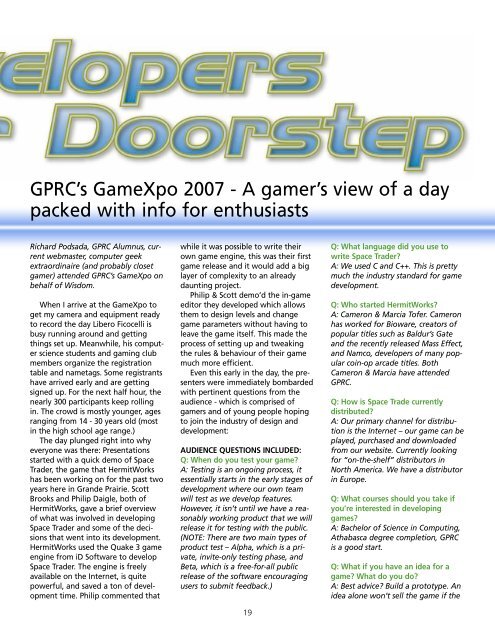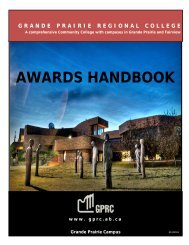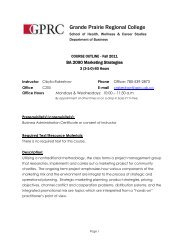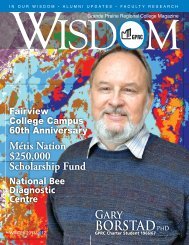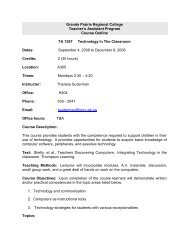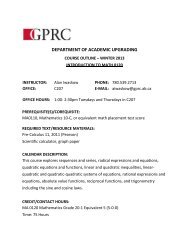Don Gnatiuk - Grande Prairie Regional College
Don Gnatiuk - Grande Prairie Regional College
Don Gnatiuk - Grande Prairie Regional College
Create successful ePaper yourself
Turn your PDF publications into a flip-book with our unique Google optimized e-Paper software.
GPRC’s GameXpo 2007 - A gamer’s view of a day<br />
packed with info for enthusiasts<br />
Richard Podsada, GPRC Alumnus, current<br />
webmaster, computer geek<br />
extraordinaire (and probably closet<br />
gamer) attended GPRC’s GameXpo on<br />
behalf of Wisdom.<br />
When I arrive at the GameXpo to<br />
get my camera and equipment ready<br />
to record the day Libero Ficocelli is<br />
busy running around and getting<br />
things set up. Meanwhile, his computer<br />
science students and gaming club<br />
members organize the registration<br />
table and nametags. Some registrants<br />
have arrived early and are getting<br />
signed up. For the next half hour, the<br />
nearly 300 participants keep rolling<br />
in. The crowd is mostly younger, ages<br />
ranging from 14 - 30 years old (most<br />
in the high school age range.)<br />
The day plunged right into why<br />
everyone was there: Presentations<br />
started with a quick demo of Space<br />
Trader, the game that HermitWorks<br />
has been working on for the past two<br />
years here in <strong>Grande</strong> <strong>Prairie</strong>. Scott<br />
Brooks and Philip Daigle, both of<br />
HermitWorks, gave a brief overview<br />
of what was involved in developing<br />
Space Trader and some of the decisions<br />
that went into its development.<br />
HermitWorks used the Quake 3 game<br />
engine from iD Software to develop<br />
Space Trader. The engine is freely<br />
available on the Internet, is quite<br />
powerful, and saved a ton of development<br />
time. Philip commented that<br />
while it was possible to write their<br />
own game engine, this was their first<br />
game release and it would add a big<br />
layer of complexity to an already<br />
daunting project.<br />
Philip & Scott demo’d the in-game<br />
editor they developed which allows<br />
them to design levels and change<br />
game parameters without having to<br />
leave the game itself. This made the<br />
process of setting up and tweaking<br />
the rules & behaviour of their game<br />
much more efficient.<br />
Even this early in the day, the presenters<br />
were immediately bombarded<br />
with pertinent questions from the<br />
audience - which is comprised of<br />
gamers and of young people hoping<br />
to join the industry of design and<br />
development:<br />
AUDIENCE QUESTIONS INCLUDED:<br />
Q: When do you test your game?<br />
A: Testing is an ongoing process, it<br />
essentially starts in the early stages of<br />
development where our own team<br />
will test as we develop features.<br />
However, it isn’t until we have a reasonably<br />
working product that we will<br />
release it for testing with the public.<br />
(NOTE: There are two main types of<br />
product test – Alpha, which is a private,<br />
invite-only testing phase, and<br />
Beta, which is a free-for-all public<br />
release of the software encouraging<br />
users to submit feedback.)<br />
19<br />
Q: What language did you use to<br />
write Space Trader?<br />
A: We used C and C++. This is pretty<br />
much the industry standard for game<br />
development.<br />
Q: Who started HermitWorks?<br />
A: Cameron & Marcia Tofer. Cameron<br />
has worked for Bioware, creators of<br />
popular titles such as Baldur’s Gate<br />
and the recently released Mass Effect,<br />
and Namco, developers of many popular<br />
coin-op arcade titles. Both<br />
Cameron & Marcia have attended<br />
GPRC.<br />
Q: How is Space Trade currently<br />
distributed?<br />
A: Our primary channel for distribution<br />
is the Internet – our game can be<br />
played, purchased and downloaded<br />
from our website. Currently looking<br />
for “on-the-shelf” distributors in<br />
North America. We have a distributor<br />
in Europe.<br />
Q: What courses should you take if<br />
you’re interested in developing<br />
games?<br />
A: Bachelor of Science in Computing,<br />
Athabasca degree completion, GPRC<br />
is a good start.<br />
Q: What if you have an idea for a<br />
game? What do you do?<br />
A: Best advice? Build a prototype. An<br />
idea alone won’t sell the game if the


